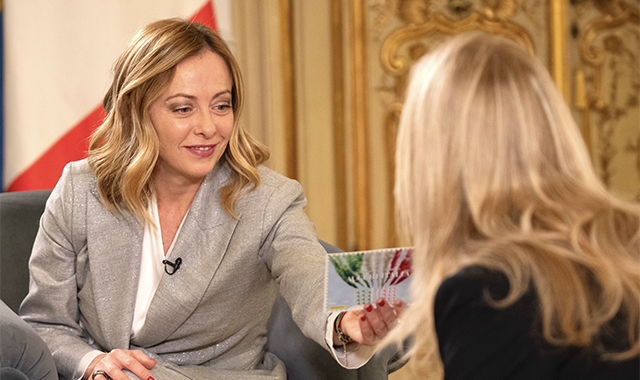Italian Prime Minister Giorgia Meloni gave an exclusive interview to TG Poste, in which she took stock of her first year as Prime Minister and expressed her appreciation for Poste Italiane’s role and activities in the country, from the Polis project to the first on-line platform for Made in Italy products in the world. Meloni stated that Poste represents “our country’s excellence. I am proud of that.”
The NRRP
The Polis Project, says Meloni, “is an extraordinary example of how all institutional levels, the public, the private, must be able to work together to make these resources available. I take half a step back because the NRRP is perhaps one of the objectives that has given us the most headaches and the most satisfaction this year. More headaches because we are clearly talking about the most impressive plan in Europe, 190 billion, and because I remember, when faced with the proposal to fix the plan, to revise it according to changing needs, many said “we will lose resources. No, this cannot be done in a few weeks”. We got the third instalment paid. We were given the green light for the fourth instalment. We will be the first European nation to receive the fourth instalment. We changed the objectives of the NRRP, concentrating those resources on what was most needed,” she said. “Impossible,” Meloni continued, “is what those who lack courage say, because if you have the courage to do things, and you have the right people who want to get this nation on its feet, results can be achieved. The Polis Project is evidence of this. Let’s hope that everyone is as expert as Poste Italiane is at moving forward quickly.“
The significance of the Polis Project
Continuing on the subject of the Polis Project, the Prime Minister stated that “it has a beautiful meaning. We have always said that post offices were one of the most widespread networks in Italy, and it would have been foolish of us not to try to make this diffusion more useful for citizens by doing what you know very well, that is a beautiful joint venture in which the effectiveness and efficiency of Poste Italiane and its extensiveness are combined with a series of services that we are now able to bring to all citizens. Even to those who were often second-class citizens because they had a thousand more difficulties than others to make a simple document. Today, it can be done. I believe that the speed at which the initiative is being realised is also one of the best examples of how the NRRP should be implemented, so I am very pleased with the significance of this project and how we are achieving it together.
The government’s commitment to Caivano
Meloni then spoke on the government’s commitment to Caivano and all the other free zones in Italy: “This too,” she explained, “is a way for all of us to work towards one goal and understand that, if we focus our attention and our energy, our resources, we can achieve goals that were once considered unimaginable. In Italy, we have several free zones. We have several territories where the government, at some point, decided to back away because it thought it was too difficult to solve the problem. I think that a serious government cannot make such a choice, but I also know that it is very unlikely to think that we can solve all the problems we have in our country at the same time. So, for Caivano,” she added, “we decided to conduct an experiment, and that is to show that if politics, as well as private actors, and also companies, even all the institutional levels, the police, the judges, in other words, the good part of this nation, were concentrated, it would have been possible to demonstrate that those areas are not lost. And that an example that is unfortunately also unjustly known — because there are so many good people living in Caivano — in the news for its dilapidation or crime problems, can become a model that is exactly the opposite.” “We,” continued Meloni, “are working at a cadence and with a daily presence in Caivano. Someone has complained that there are too many ministers going to Caivano, but it is not just ministers, because there is the Italian Post Office, there are the military engineers, there are many, many companies that voluntarily made themselves available when we launched this challenge because they believed, with us, that the government, that Italy could show that things can change for the better. Look, the greatest satisfaction came from seeing the post of a mother who was finally able to take her son to the park in Caivano. Something that for us is the most natural thing in the world. For some people, it is not. Then, in small steps, you put a piece of brick in every day. You do it with everyone’s contribution. And, so I must, of course, also thank Poste Italiane for the important brick it has put into this project. But, I won’t give up until I can show that things can change. I am sure that if we succeed in Caivano, since, in the meantime, we are also making rules that are also valid for all the other Caivanos in Italy, we will be able, little by little, to deal with all the other free zones and restore rights to citizens who we cannot allow to be second-class citizens.“
Poste’s support for Made in Italy
On the subject of TG Poste, Prime Minister Giorgia Meloni announced an on-line Made in Italy platform created by Poste Italiane. “Meanwhile,” Meloni explained, “I’m doing my part because I want to tell you that I travel all over the world with a Poste Italiane suitcase, with the Poste logo, so I’m doing my part in this model of Italy… But apart from that, we are working a lot on Made in Italy, which obviously has various levels of intervention. There is the issue of the fight against counterfeiting. There is the issue of the fight against Italian sounding. The counterfeiting of Italian products falsely sold as Italian products is worth tens of billions of euros every year. We do this by defending the supply chains. We have made a specific regulation precisely for Made in Italy to put resources on the supply chains, for a sovereign fund, for our excellence, for the Made in Italy school, that is, for the generational change in training the workers necessary for Made in Italy. Because then the paradox is that a fundamental piece of our economy, of many sectors, think fashion, you can no longer find well-paid skilled labour to do these jobs, and so you have to train them, you have to do a marketing campaign as well.” “Poste Italiane,” she continued, “in my opinion, can do something more. I have a project that I have spoken about several times. I have also spoken about it with the top management of Poste Italiane because I think that Poste has the know-how, the ability and the authority also to imagine an Italian product platform. I would like an on-line platform for Italian products. Try to imagine on one hand, giving everyone the opportunity to sell what is Italian product and, on the other hand, certifying what is Italian product. It is one of the many projects that I have in mind, about which I have spoken with Poste Italiane several times, and who knows, we may be able to make progress on this in the coming months as well. But, I really believe that if Poste Italiane can’t do it, it’s almost impossible to do such a thing.”
The first woman to head the government
Prime Minister Giorgia Meloni took stock of her first year as the first woman to head a government in Italy. “I have been underestimated all my life. This can be an advantage. It happens to many women. It can be an advantage. Because, when you are underestimated, you can only amaze. This happens to us a lot. We can also claim our own spaces, as long as we do not believe what others have decided is our limit. And this is a mistake that women sometimes make. Believing that the limits others have imposed are the limits we really have. I never believed that. I always thought there was an ability, a speed, a concreteness in women that men sometimes lack and that this should be our strength. And I simply did not accept either that I was privileged because I was a woman or that I was discriminated against because of it. I wanted to fight, but I was always aware that you have to fight on equal terms. It is the reason why I am not a fan of quotas, the reason I am not fond of those who think that gender equality is a concession. If we really believe in equality, we must compete at the same level as others, without fast tracking and without limitations. The only real limitation we have is conciliation. And so there, you actually have to work. You know that the government, from the issue of parental leave to decontribution for working mothers, is trying to give signals, especially about working mothers. You don’t have to be forced, in a normal society, to have to choose between being a mother and being able to have a career. The two things can go perfectly well together. In systems that have serious welfare, the two things go together, and this is the signal we want to give. And if we manage to bridge this gap that prevents many women from being able to fully prove themselves, because some choices they have not been able to make, I think quotas may have to be asked of someone else, but in short, I think this problem really does not arise. But, the first thing you have to understand is the awareness of what you can do. It is not determined by others. We decide that. We decide what limits can be imposed on us. So, I don’t have any scores to settle because I have always settled them with facts.” “I settled them with facts showing that I never let others tell me what I could or could not do. I always decided it myself. And then, in short, we will see at the end of this journey whether we were not very good, better, up to standard, not up to standard. This is not for me to judge. In this context, in the context of what I do, the Italians must judge, and they will judge. That is the only judgement I am interested in. Men and women, eh, everyone has to judge that, but I certainly never saw it as a problem that others expected little from me,” Meloni further stated.
Satisfactions and disappointments
“My greatest satisfaction,” Meloni continued, “is that when I stood before the Chamber and mentioned being an underdog, I said ‘I am a person used to disproving predictions. I intend to disprove many more’. After one year, I can say that I have done that. If I think about what was said when we were still in the election campaign about Italy’s international isolation in the event that there was a centre-right government, namely a Meloni-led government, what was said about the reaction that investors would have in Italy, about the economy collapsing, about jobs being lost, and I look at today’s reality, after a year, I am happy to have disproved those predictions, as I have often done and as I had promised I would do. I have had many disappointments, as always. I am a person who is never completely satisfied, always thinking that I can do better. I believe I have to do even better. I certainly expected much more from the day-to-day work I did on immigration than the results that came. But, all the more reason not to give up until I also bring this result home. It is normal that when you have responsibilities like we have, on some things you win, on some things you lose, some things succeed, some things fail. It takes many things. It also takes luck very often. But it makes a difference how you react even when you fail. When I fail, I start over until I succeed.“
A postcard to Italians
Finally, the Prime Minister wrote a symbolic postcard to be sent to all Italians: “The sentiment I want to write to Italians is this. After a year as Prime Minister, I have travelled around the world. I knew something before I was Prime Minister. I didn’t even understand it at this level. We do not realise how much hunger for Italy there is in the world, how much respect for Italy there is in the world, how much desire for Italy there is in the world. We are the only ones who do not believe that. We are the only ones who do not really understand the value this nation has, because outside our borders, everyone sees it. So, if we recover some pride — this concept is not for the postcard — if we recover some of our awareness, some of our pride, we really will have no limits. And so, long live Italian pride.“









